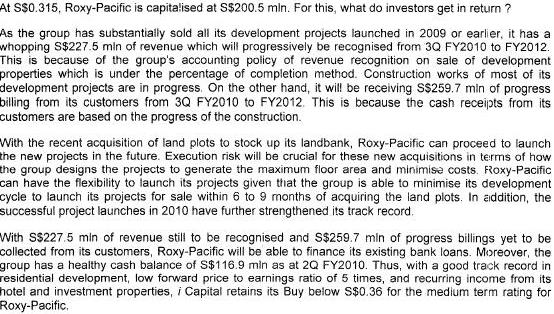Excerpts from analyst reports…..
The following is excerpted from i-Capital’s weekly stock market newsletter, the medium that Capital Dynamics uses to provide its investment advice. Capital Dynamics’ founder and MD is Tan Teng Boo, a hotshot fund manager.

Recent story: SIAS Research says ‘increase exposure’ to Roxy-Pacific
Credit Suisse: ‘Chinese measures to de-rate property sector?’
Analysts: Jinsong Du & Ronney Cheung
Our recent ground checks suggest that home buyers’ sentiment has turned more positive after taking the wait-and-see attitude for a few months. With more supply and developers’ increasing willingness to lower prices, we expect a continued, albeit gradual, rebound for the sector.
● On the other hand, we also expect the government to further squeeze developers’ balance sheet by widening and tightening the measures such as investigations into land hoarding, and controls on financing and pre-sales proceeds.
● While many fear an upcoming de-rating for the sector, we remain confident because: 1) public housing’s impact should be minimal; 2) urbanisation rate was overestimated; and 3) government measures should accelerate industry consolidation.
● We still believe that the diversified players with high asset turns, such as China Vanke and COLI, have less near-term risks and better long-term potential. Those with high gearing, such as R&F and Greentown, could suffer from balance sheet squeeze.
In the sector, we recommend that investors buy selectively on corrections.
Government to further squeeze developers’ balance sheet: suppress property prices as well as sustain the growth of real estate fixed asset investment.
For the second time in a week, Vice Premier Li Keqiang hosted a government meeting on public housing on 21 August. He emphasized that governments should implement more measures to increase near-term supply of commodity housing (i.e., private housing).
We believe this means it is certain that many more cities (including Beijing) will implement controls on developers’ presales proceeds. If all measures are strictly implemented (i.e., construction loan control, pre-sales proceeds control, and stop land hoarding), increasing asset turns would be the only way for developers to get the cash inflow they need.
We expect developers to: 1) cut property prices in order to sell faster; and 2) accelerate construction in order to deliver faster. We continue to believe that different cities’ level of implementation for these measures will vary significantly – for example, Beijing may implement those measures more vigorously than other cities.
Therefore, we continue to prefer diversified players with high asset turns, to those with high gearings.
The sector should not de-rate – public housing not a threat; urbanisation and industry consolidation to sustain the growth.
Vice Premier Li also emphasised rental housing. This further confirms our 14 June 2010 report's analysis that rental housing should become the main focus for China’s public housing development going forward.
We believe this means that public housing in China will be similar to that in Hong Kong – it should help solve low-income class’ housing needs, but have minimal impact on the private housing markets over the long term.
While some believe China’s real urbanisation rate far exceeds the official 47%, we believe it should be much lower than 47% – at least 30% of the 600 mn city dwellers enjoy little urban benefits. We expect the future urbanisation to switch from the ‘expansionary’ mode of merely increasing urban areas to the ‘inclusive’ mode of increasing the penetration of public welfare, and thus boost ‘real’ urbanisation.
We also expect the government measures to have a positive long-term impact by accelerating property sector consolidation.






